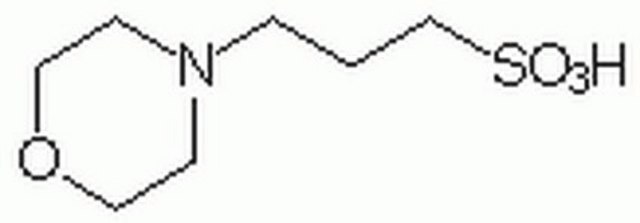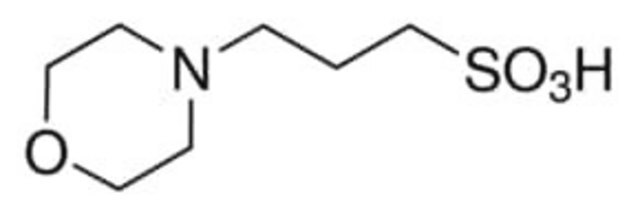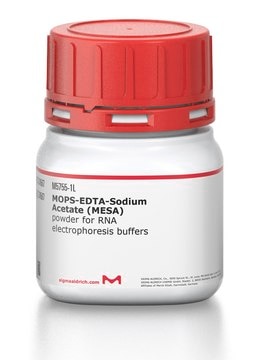69947
MOPS
≥99.5% (titration), powder or crystals, for molecular biology, BioUltra
Synonym(s):
3-(N-Morpholino)propanesulfonic acid, 4-Morpholinepropanesulfonic acid
About This Item
Recommended Products
product name
MOPS, BioUltra, for molecular biology, ≥99.5% (titration)
grade
for molecular biology
Quality Level
product line
BioUltra
assay
≥99.5% (titration)
form
powder or crystals
impurities
DNases, none detected
RNases, none detected
insoluble matter, passes filter test
phosphatases, none detected
proteases, none detected
ign. residue
≤0.1% (as SO4)
loss
≤1% loss on drying, 110 °C
pH
2.5-4.0 (25 °C, 1 M in H2O)
useful pH range
6.5-7.9
pKa (25 °C)
7.2
solubility
H2O: 1 M at 20 °C, clear, colorless
anion traces
chloride (Cl-): ≤50 mg/kg
sulfate (SO42-): ≤50 mg/kg
cation traces
Al: ≤5 mg/kg
As: ≤0.1 mg/kg
Ba: ≤5 mg/kg
Bi: ≤5 mg/kg
Ca: ≤10 mg/kg
Cd: ≤5 mg/kg
Co: ≤5 mg/kg
Cr: ≤5 mg/kg
Cu: ≤5 mg/kg
Fe: ≤5 mg/kg
K: ≤50 mg/kg
Li: ≤5 mg/kg
Mg: ≤5 mg/kg
Mn: ≤5 mg/kg
Mo: ≤5 mg/kg
Na: ≤50 mg/kg
Ni: ≤5 mg/kg
Pb: ≤5 mg/kg
Sr: ≤5 mg/kg
Zn: ≤5 mg/kg
λ
1 M in H2O
UV absorption
λ: 260 nm Amax: 0.020
λ: 280 nm Amax: 0.015
SMILES string
OS(=O)(=O)CCCN1CCOCC1
InChI
1S/C7H15NO4S/c9-13(10,11)7-1-2-8-3-5-12-6-4-8/h1-7H2,(H,9,10,11)
InChI key
DVLFYONBTKHTER-UHFFFAOYSA-N
Looking for similar products? Visit Product Comparison Guide
Related Categories
General description
Application
- as a component of Roswell Park Memorial Institute (RPMI) medium for diluting fungal inoculum
- as a buffer in capillary-zone electrophoresis to test performance
- for the dilution of proteins from algal samples
Other Notes
wgk_germany
WGK 1
flash_point_f
230.0 °F
flash_point_c
110 °C
ppe
dust mask type N95 (US), Eyeshields, Gloves
Choose from one of the most recent versions:
Certificates of Analysis (COA)
Sorry, we don't have COAs for this product available online at this time.
If you need assistance, please contact Customer Support.
Already Own This Product?
Find documentation for the products that you have recently purchased in the Document Library.
Customers Also Viewed
Our team of scientists has experience in all areas of research including Life Science, Material Science, Chemical Synthesis, Chromatography, Analytical and many others.
Contact Technical Service


